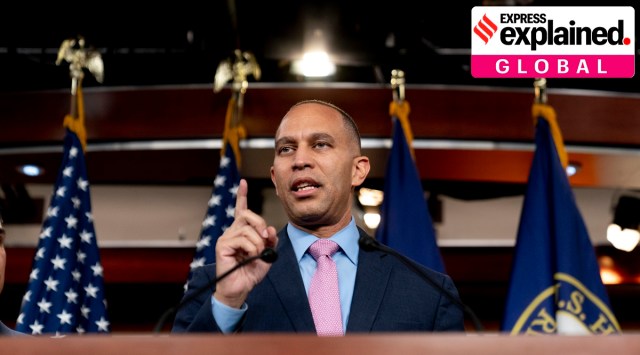Who is Hakeem Jeffries, the first black House leader in US history?
Hakeem Jeffries takes charge as a minority leader in the House, a difficult position that will need him to work with the Republicans while furthering the interest of his own party and its electoral base.
 Touted as the “Barack Obama of Brooklyn,” a comparison that Jeffries has himself rejected, he was successfully elected to the 113th US House of Representatives in 2013. (AP Photo/Andrew Harnik)
Touted as the “Barack Obama of Brooklyn,” a comparison that Jeffries has himself rejected, he was successfully elected to the 113th US House of Representatives in 2013. (AP Photo/Andrew Harnik) Hakeem Jeffries was on Tuesday (January 3) officially elected as the Democratic Party’s leader in the new US House of Representatives, one of the houses of the United States’ bicameral legislature.
On a day when the lower chamber of Congress witnessed an infighting among Republicans and was adjourned without choosing a speaker, Jeffries made history by becoming the first black American to hold such a high position in the US’s federal legislature. Succeeding incumbent House Speaker Nancy Pelosi, his ascent marks the oncoming of a new generation of Democratic Party leadership with many of the “old guard” headed towards retirement.
The midterm elections held in November 2022 led to the Democratic Party losing control over the House while holding the Senate. While the party performed above expectations, the split Congress will pose major challenges.
Hakeem Jeffries takes charge as a minority leader in the House, a difficult position that will need him to work with the Republicans while furthering the interest of his own party and its electoral base.
Hakeem Jeffries: Rise to the top
A native of Brooklyn, New York, Jeffries studied political science, public policy and law. After getting his law degree in 1997, he built a successful practice in litigation. However, he was already foraying into politics as early as 2000, when he contested and lost the Democratic Party Primary to incumbent assemblyman Roger Green. After controversies and failures, Jeffries finally managed to get elected to the state assembly from New York’s 57th District in 2006, comfortably winning both his primary and the contest with Republican Henry Weinstein.
During his six-year tenure in the state assembly, he would introduce more than 70 bills, earning himself popularity and political capital for an eventual run to the US Congress. In 2012, he announced his resignation from the state assembly, saying, “Washington is broken. Congress is dysfunctional. People are suffering. We deserve more.”
Touted as the “Barack Obama of Brooklyn,” a comparison that Jeffries himself rejected, he was successfully elected to the 113th US House of Representatives in 2013. It would take him only another decade to become the most powerful Democrat in the House.
A report in The New York Times said that the Democrats for several years had been preparing Jeffries as “a potential leader” but it was only after Pelosi decided to resign as speaker of the House that he stepped forward.
Hakeem Jeffries’ politics
A self-declared progressive, Hakeem Jeffries holds both progressive and conservative positions on various issues. While he holds progressive positions on criminal justice reform, especially a matter of concern for black Americans, gun reform and reproductive rights, he is also expected to tame the left-wing of the Party with a history of openly disavowing “radical” democratic socialism.
Over his time in politics, his vocal support for Israel in its conflict with Palestine has been both commended and criticised. He has openly criticised various individuals and groups which have raised concern over Israel’s atrocious human rights record, saying in a rally in 2014, “Israel should not be made to apologise for its strength.”
Observers have pointed out that one of his biggest campaign donors is pro-Israel advocacy group AIPAC, which also supported Republican candidates, some of whom publicly discredited the results of the 2020 election. Palestinian groups have already flagged concern over his “support for Israel’s apartheid regime.”
Thus, while Jeffries is a part of a new generation of Democratic Party leaders, his politics is not nearly as progressive as it ostensibly seems. Perhaps that is one of the biggest reasons for his meteoric rise: while holding positions that cater to a large majority of the democratic base, he also manages to balance things out for more fence-sitting voters and moderate Republicans, forming a broad coalition of support.
As the Democrats face a challenging couple of years in the runup to the 2024 General Elections and a looming presidential run by Donald Trump, Jeffries has his work cutout, furthering the agenda of the White House in a split-Congress.
- 01
- 02
- 03
- 04
- 05






































